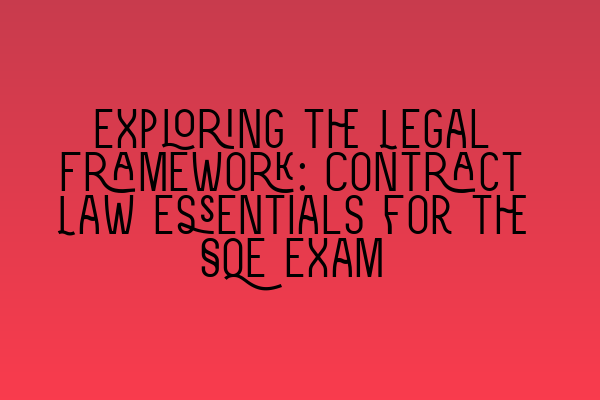Exploring the Legal Framework: Contract Law Essentials for the SQE Exam
Contract law is a fundamental aspect of legal practice that every aspiring solicitor must master. Whether you are preparing for the Solicitors Qualifying Exam (SQE) or looking to enhance your understanding of contract law, this comprehensive guide will provide you with the essential knowledge and insights needed to excel in this area.
Understanding the Basics
Before delving into the intricacies of contract law, it’s crucial to have a solid grasp of the basics. At its core, a contract is a legally binding agreement between two or more parties. It sets out the rights and obligations of the parties involved and provides a framework for resolving disputes.
When exploring contract law, you will encounter various essential concepts:
- Offer and Acceptance: An offer is a proposal made by one party to another, while acceptance signifies agreement to the terms of the offer. This forms the foundation of a legally binding contract.
- Consideration: Consideration refers to something of value exchanged between the parties. It can be in the form of money, goods, or services and is necessary for the contract to be valid.
- Intention to Create Legal Relations: For a contract to be enforceable, the parties must demonstrate an intention to enter into a legally binding agreement.
- Capacity: Parties must have the legal capacity to enter into contracts. This means they must be of sound mind, of legal age, and not under duress or undue influence.
- Terms and Conditions: Contracts include terms and conditions that outline the rights and obligations of the parties, the subject matter, and any other relevant details.
- Breach and Remedies: If one party fails to fulfill its obligations under the contract, it constitutes a breach. Various remedies are available in such cases, including damages, specific performance, and injunctions.
Key Principles in Contract Law
Contract law is built upon several fundamental principles that guide the formation, interpretation, and enforcement of contracts. Familiarize yourself with these principles to enhance your comprehension:
- Consensus ad idem: This Latin phrase translates to “meeting of minds.” It signifies that all parties must be in agreement regarding the terms and conditions of the contract.
- Privity of Contract: Only parties who are direct signatories to a contract can enforce or be bound by its terms. Third parties generally do not have any enforceable rights under a contract.
- Doctrine of Consideration: Consideration must be present for a contract to be valid. It ensures there is a mutual exchange of value between the parties.
- Frustration of Contract: In certain circumstances, a contract may become impossible to perform due to unforeseen events. The doctrine of frustration provides relief from further obligations under such circumstances.
- Misrepresentation: If false information is provided to induce a party to enter into a contract, it can be deemed as misrepresentation, which can lead to the contract being voidable.
- Statutory Regulations: Various statutes and regulations, such as the Consumer Rights Act 2015, Sale of Goods Act 1979, and Unfair Contract Terms Act 1977, govern contractual relationships in specific contexts.
Mastering the SQE Exam
As you prepare for the SQE, it is essential to adopt effective study techniques to maximize your chances of success. Here are some tips to help you tackle the contract law section of the exam:
- Thoroughly review the SQE syllabus: Familiarize yourself with the specific topics and subtopics outlined in the syllabus to ensure you cover all the required areas.
- Practice past exam questions: Work through past exam papers to gain a better understanding of the types of questions likely to be asked and to practice your application of contract law principles.
- Stay updated with recent case law: Contract law is constantly evolving, with new cases shaping its interpretation. Stay informed about recent landmark cases and their implications.
- Form study groups: Collaborating with peers can enhance your understanding of contract law topics. Discussing complex concepts and debating different interpretations can deepen your knowledge.
- Seek expert guidance: Consider working with experienced contract law tutors or attending revision courses to gain valuable insights and tips.
- Utilize mnemonic techniques: Mnemonic devices can help you remember complex legal concepts, making them easier to recall during the exam.
Conclusion
Contract law is a vital discipline within the legal profession, and a solid understanding of its principles is crucial for solicitors. By building a strong foundation in contract law and applying effective study techniques, you can confidently tackle the contract law section of the SQE exam. Persist in your studies, seek support when needed, and you will be well on your way to becoming a successful contract lawyer.
